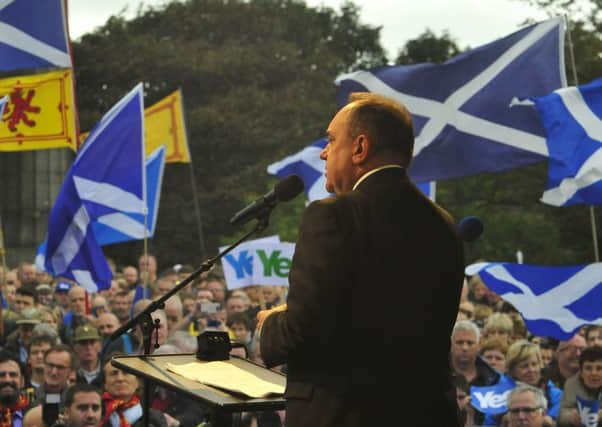Alex Salmond: 100 days to make independence a reality


Tomorrow marks the start of that countdown to what will be one of the most exciting and historic days this nation has ever seen.
It will be a decision on whether we are to be an independent country once again, joining the international community as an equal partner after an absence of more than 300 years.
Advertisement
Hide AdAdvertisement
Hide AdThe referendum on 18 September is the biggest opportunity Scotland has had in those three centuries, and it is one I firmly believe we will grasp with both hands.
The referendum is rightly a decision that will be made by those living and working in Scotland, including many originally from other parts of the UK and beyond.
The eyes of the world are on Scotland, and we should be proud of the example we are setting in terms of the profoundly democratic and peaceful nature of the debate on our future – not something that is always the case elsewhere.
But that huge international focus, and all the opportunities it will bring, will only stay on Scotland with a Yes vote.
There now appears to be consensus among all the main parties that Scotland needs substantially more powers.
But a Yes vote is the only option on the ballot paper which offers those powers. The democratic case for an independent Scotland is at its heart a very straightforward one. It is founded on the simple premise that it is fundamentally better for all nations if decisions affecting them are made by those who live and work there.
Scotland is a hugely wealthy country. Official figures show that, as an independent nation, we would be the 14th most prosperous per head in the developed world, ahead of France, Japan and the UK itself.
Scotland has paid more taxes per head than the rest of the UK for every one of the last 33 years.
Advertisement
Hide AdAdvertisement
Hide AdScotland’s huge economic strength is a reason the global credit rating agency Standard & Poor’s recently declared that – even without North Sea oil and gas – Scotland is a wealthy nation and, as an independent country, would qualify for its “highest economic assessment”.
Unfortunately, despite that huge native wealth meaning we are one of the wealthiest countries on the planet, for too many people living in Scotland today it does not feel that way.
Westminster rule has turned the UK into one of the most unequal countries in the developed world.
In Scotland that means too many people, including many children, are consigned to a life of poverty, while we still have some of the lowest life expectancy statistics in Europe.
That is simply unacceptable, and a Yes vote this September will give us the tools we need to ensure Scotland’s great human and natural resources are put to work to create not just a prosperous economy but a fairer and more just society.
Independence will mean Scotland is no longer subject to Westminster policies imposed against the wishes of our democratic representatives.
A quarter of a century ago it was Margaret Thatcher’s poll tax – today it is the bedroom tax and the ongoing obscenity of Trident weapons of mass destruction located just a short distance from Scotland’s largest city.
An independent Scotland will also help to rebalance the economy across these islands, to everyone’s benefit, and present an opportunity for the rest of the UK to address the economic and social challenges it faces.
Advertisement
Hide AdAdvertisement
Hide AdAnd the argument that Labour or any other party needs Scotland in order to be elected at Westminster is simply not true.
Scottish votes have determined the government of the UK on only two occasions since the Second World War, and they were both over 40 years ago.
The ties that bind the nations of these islands will continue and flourish after Scotland becomes independent. The people of England, Wales and Northern Ireland will remain Scotland’s closest friends, as well as our closest neighbours.
We don’t have to look far for an example of that. Ireland’s president, Michael D Higgins, recently made a highly successful state visit to the UK.
When the Queen spoke at the banquet in his honour at Windsor Castle, she observed that “there is today no closer working relationship for my government than that with Ireland”.
Indeed, in 1949, when Westminster passed the Ireland Act, it specifically stated that Ireland was not to be regarded as a “foreign country”.
No other nation in history has been as well placed as modern Scotland to become independent – and when 18 September arrives, I am confident the people will say “Yes”.